Jainita GajjarDonner Fellow
Centre for Addiction and Mental Health Thanks to the Donner Fellowship, I spent my summer working at the Centre for Addiction and Mental Health (CAMH). During my summer at CAMH, I was involved in both civil litigation and legal research. On the civil litigation side, I assisted in the preparation of hearings before the Consent and Capacity Board and drafted appellate documents, including motion materials and facta for the Ontario Superior Court of Justice and Court of Appeal. On the legal research side, I was involved in an initiative to develop a pilot project on a new clinical practice at CAMH, and completed an extensive legal literature review and drafted educational materials for clinicians. I also conducted a cross-jurisdictional analysis of mental health law statutes to help inform recommendations to reform provisions of the Health Care Consent Act, 1996. The Donner Fellowship not only provided me with the opportunity to enhance my practical legal skills, but also allowed me to gain in-depth exposure to and experience in health law. I am thankful to the Donner Fellowship and CAMH for this summer experience. |
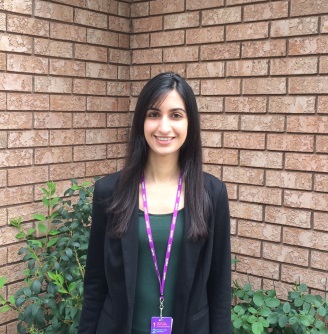
Jainita at CAMH |
Jadine LannonDonner Fellow
British Columbia Civil Liberties Association (BCCLA) The Donner Fellowship allowed me to spend the summer interning at the BC Civil Liberties Association (BCCLA), Canada's oldest and most active civil liberties association. As a legal intern, I was able to participate in many of the BCCLA's projects, including multiple constitutional challenges to federal and provincial legislation. Through my time at the BCCLA, I gained both sobering insight into the status of human rights and civil liberties in Canada and invaluable experience in the means and methods for promoting a more just and equitable Canadian society through legal advocacy. The bulk of my work with the BCCLA was related to constitutional litigation. I prepared affidavits, performed document summaries, attended BC Supreme Court at the trial level, and sat in on strategic litigation meetings and case conferences. I also performed extensive legal research on a variety of current and pressing topics and issues in Canadian constitutional and human rights law, and participated in legal and policy advocacy through the drafting of position statements and policy submissions for investigative bodies such as UN Special Rapporteurs and Parliamentary committees. Through the Donner Fellowship, I was able to spend the summer doing legal work that I found to be extremely meaningful, all while building my skillset in an area of legal practice that I would like to continue to work in as a legal professional. Overall, the Donner Fellowship and the BCCLA have given me the insight and experience needed to feel confident in and committed to my decision to pursue a career in the public interest. | 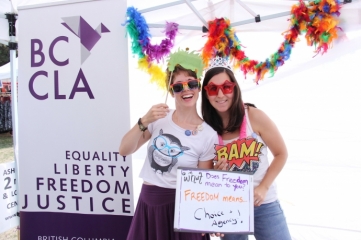 Jadine (left) at a public BCCLA event |
Michael MorgenthauDonner Fellow
LGBTQ Parenting Network As a Donner Fellow, I was able to research and draft publications on assisted reproduction and the law for the LGBTQ Parenting Network. The LGBTQ Parenting network is a community organization operating out of the Sherbourne Health Centre. They support LGBTQ parents through training, research, resource development and community organizing. For many LGBTQ people in Ontario, the path to being a parent can be long and difficult. The laws around assisted reproduction are complex and often unclear. With the support of the Donner Fellowship I developed a publication that explains the laws around egg and sperm donation, as well as surrogacy. We turned to community members for feedback, and they clearly expressed that these publications were filling a real need. This experience allowed me to have a positive impact. I was able to learn about a novel and fascinating area of the law. I gained exposure to a growing legal market. My work environment was supportive and positive. The Donner Fellowship experience was incredible, and I could not be more thankful or give more encouragement to those considering applying. | 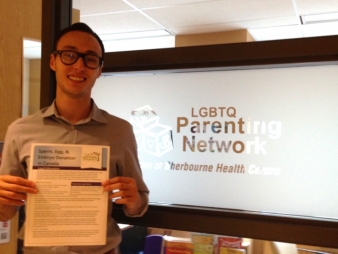 Michael at the LGBTQ Parenting Network |
| Monica Poremba Donner Fellow
Canadian Environmental Law Association (CELA) The Donner Fellowship allowed me to spend my 2L summer at the Canadian Environmental Law Association (CELA) where I explored my passion for both environmental law and helping to serve underrepresented populations in Ontario. CELA is a non-profit Legal Aid Clinic that provides services to low income individuals and disadvantaged communities across Ontario in environmental law matters. I worked on a project that aimed to address the relationship between the cumulative effects of air pollution and poverty in Ontario. There is a plethora of evidence that those who live in low socioeconomic communities face the double burden of both poverty and high levels of air pollution. My project aimed to consolidate this evidence, analyze the current state of the law in Ontario and other jurisdictions regarding environmental equity and provide recommendations moving forward for legislation to address this problem. It exposed me to both legal and scientific research and introduced me to the world of legislative drafting. I was also exposed to other ongoing litigation cases at CELA, and had the opportunity to conduct legal intake, being the first point of contact for members of the public that call in wanting information about their environmental rights. Working at CELA was a wonderful experience and has led to securing an articling position there in 2016/17. I am so grateful to CELA and to the Donner Fellowship program for giving me this opportunity to work in environmental law. | 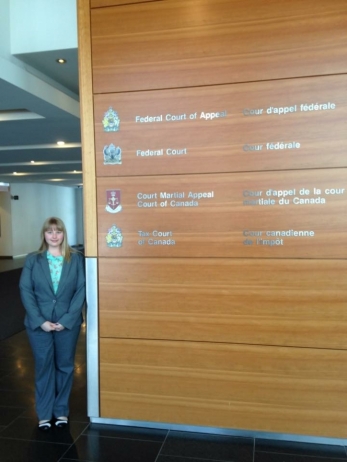 Monica at the Federal Court of Appeal during her placement with CELA |
Yolanda SongDonner Fellow
Barbra Schlifer Clinic Thanks to the Donner Fellowship, I was able to spend my summer working at the Barbra Schlifer Commemorative Clinic. The Schlifer Clinic provides free integrated legal, counselling, and language interpretation services to women survivors of domestic violence. Working at the Schlifer Clinic taught me a great deal about violence against women and the challenges that survivors face when seeking legal remedies and justice. I worked with the Schlifer Clinic’s staff migration lawyer to draft affidavits on gender-based violence topics, with the goal of educating decision-makers about the nature and impact of domestic violence and thereby eliminating one of the major obstacles faced by migration lawyers who work with domestic violence survivors. I researched a number of topics, including psychological trauma, the prevalence and nature of domestic violence, myths surrounding domestic violence, and the treatment of psychological report evidence by Ontario tribunals. I also researched and drafted memoranda on country conditions for specific case files and was able to help my supervising lawyer secure a stay of removal for at least one client. This summer has been a wonderful learning experience and has reaffirmed my commitment to social justice and public interest work. I am grateful to the Schlifer Clinic and the Donner Fellowship program for making this experience possible. | 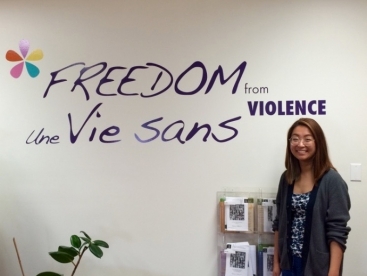
Yolanda at the Barbra Schlifer Clinic |
Alexandra Wong Donner Fellow
Canadian Civil Liberties Association (CCLA) Thanks to the Donner Fellowship, I had the opportunity to work with the Canadian Civil Liberties Association (CCLA) under the Equality Program, focusing primarily on police carding and racial profiling. This summer was a particularly exciting time – at the end of April, barely a week prior to the start of my Fellowship, Toronto’s first black Chief of Police Mark Saunders assumed office, and Desmond Cole’s article, The Skin I’m In, was capturing the wider public’s attention to the issue of racial profiling. Part of my work included conducting extensive research, writing memoranda, and providing prompt support to my supervisor during media requests. I saw the work of the CCLA in action at the Toronto Police Services Board meeting where Mayor Tory introduced a motion to end carding. We advocated for the reinstatement of a policy, which has comparably stronger rights protections, as an interim measure until the Ontario government creates regulations on police carding practices. I was also involved with other aspects of the CCLA’s work, including responding to enquiries from the public on issues related to public safety and national security. I highly recommend the Fellowship for a chance to delve into and be immersed in public interest work. I owe it to the Donner Fellowship for the great and memorable experience I had at the CCLA. | 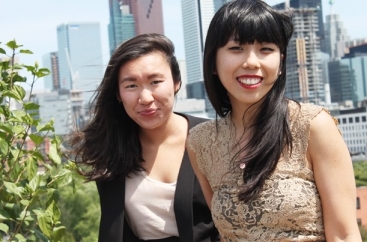 Alexandra (right) and her CCLA colleague, Kate Shao |
| Michelle Hayman SLS Fellow
Refugee Law Office Thanks to the SLS Public Interest Advocacy Summer Fellowship, I had the opportunity to spend my summer working at the Refugee Law Office, a division of Legal Aid Ontario, in Toronto. During my fellowship, I worked directly with clients in preparing refugee claims, humanitarian and compassionate applications, pre-removal risk assessments, and other immigration related submissions. During my fellowship, I interviewed clients, prepared affidavits, drafted written submissions for the federal court and conducted research on country conditions around the world. I was able to observe proceedings at the Federal Court and the Immigration and Refugee Board. In September, I will be representing a client, with supervision, at their refugee hearing. My fellowship was an excellent opportunity for me to develop my written and oral advocacy skills and gain experience in the field of immigration and refugee law. It allowed me to work directly with skilled advocates committed to fighting for refugees and immigrants in Canada. I would highly recommend the SLS Public Interest Advocacy Summer Fellowship for anyone interested in social justice work. My summer at the Refugee Law Office was the most rewarding experience of my law school experience so far. | 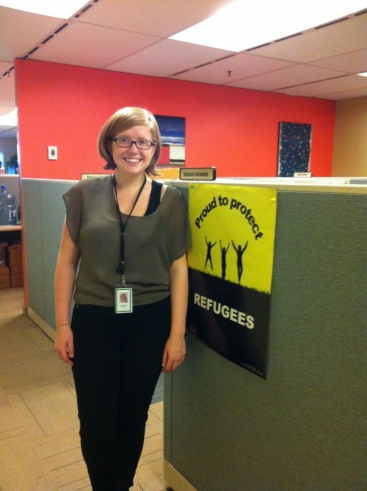 Michelle at the Refugee Law Office |
| Lara Yeo SLS Fellow
Feminist Alliance for International Action (FAFIA) The SLS Advocacy Fellowship allowed me to work with the Feminist Alliance for International Action (FAFIA), a coalition of over 70 women's and equality seeking organizations in Canada. FAFIA participates in the United Nations treaty review process by reporting and advocating on gaps in Canada's compliance with its international women's rights obligations. This summer, I contributed to FAFIA's shadow report submissions to the UN Human Rights Committee (HRC) and Committee on Economic, Social and Cultural Rights (CESCR). I participated in the research, drafting and editing of FAFIA's general submission on women's civil and political rights, as well as FAFIA's joint-submission with the Native Women's Association of Canada on the murders and disappearances of Aboriginal women and girls in Canada. I also outlined the general CESCR submission on women's economic, social and cultural rights and conducted research for the women with disabilities section. I was able to travel to Geneva in July to attend the HRC review meetings of Canada. At the UN, I advocated for the inclusion of women's rights issues in the HRC review meetings and concluding observations of Canada. The opportunity to work on women's rights reports, as well as engage in oral advocacy at the UN with international human rights experts, was both challenging and rewarding. I am grateful for the expert mentorship I received at FAFIA and to the SLS Fellowship program for providing me with this opportunity. | 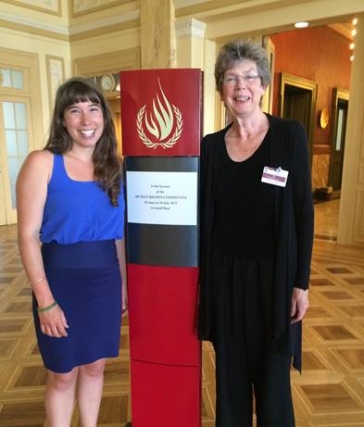 Lara (left) and her supervisor, Shelagh Day, in Palais Wilson on the occasion of Canada's sixth periodic review by the United Nations Human Rights Committee. |
Kate ShaoSLS FellowCanadian Civil Liberties AssociationThe SLS Fellowship gave me the opportunity to spend my 1L summer interning at the Canadian Civil Liberties Association (CCLA). The CCLA is a national organization based in Toronto with the mandate of defending civil liberties and constitutional rights. This summer, I worked in the organization’s Policing and Public Safety Program researching bail and pre-trial detention. My research was primarily focused on the vast inequities within Canada’s pre-conviction practices and policies. Having entered law school with the goal of pursuing a career in human rights, the CCLA provided me with exceptional insight into the field. I am incredibly grateful to the CCLA and the SLS Fellowship for the rewarding, fulfilling, and enriching experience I had this summer. The SLS Fellowship allowed me to delve deeply into civil rights matters, strengthening my passion for social justice and advocacy. I highly recommend the SLS Fellowship to anyone interested in the public interest. | 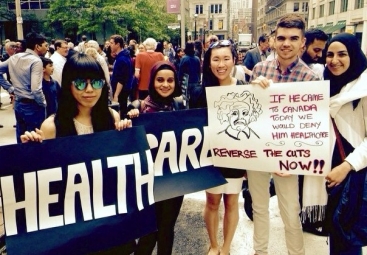 Kate (centre) and her CCLA colleagues at a rally regarding refugee health cuts. |
Deanna RoffeyCallwood Fellow
Legal Strategy Coalition on Violence Against Indigenous WomenIn summer 2015, I was a June Callwood Fellow with the Legal Strategy Coalition on Violence Against Indigenous Women, an organization dedicated to legal advocacy and research on Missing and Murdered Indigenous Women The Coalition develops legal resources that grassroots and Indigenous organizations and activists can use in their advocacy. Producing resources intended for those who experience the issues firsthand was the most rewarding part of my Fellowship. My supervising lawyer, Mary Eberts, was tremendously supportive. In my Fellowship, I felt that my voice as an Aboriginal woman was valued just as much as my legal skills. This was significant for me in light of the underrepresentation of my people in the legal field. | 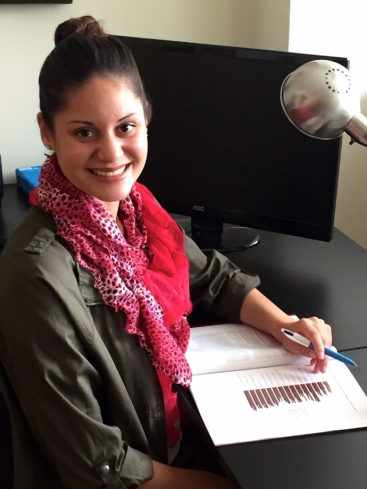 Deanna working on her Callwood project |
Niki HashieCallwood FellowNative Women's Resource Centre of TorontoI was able to complete the June Callwood Fellowship in Aboriginal Law at Native Women’s Resource Centre of Toronto (NWRCT). NWRCT is the only non-profit Aboriginal organization in Toronto that provides resources and front-line services to self-identified First Nation, Métis and Inuit women. The Centre provides a safe and supportive space for Aboriginal women to access essential services such as food bank, clothing, showers and laundry as well as other services such as child welfare advocacy, education, parenting, employment and cultural programming. The project I completed was an approximate eight hundred page Legal Resource Manual to help staff and community members of NWRCT navigate the complex realm of the Canadian legal system. This manual will act as a education tool for each coordinator to not only help further their own learning on the subject matter but assist community members in understanding their legal rights, responsibilities and obligations. Having access to an all-in-one legal guide that is relevant to the issues of the urban Aboriginal women is an extremely important asset to NWRCT and the Indigenous community at large. I would like to say Chi-Miigwetch to the June Callwood Program for Aboriginal Law, the Faculty of Law for supporting such an important opportunity for Aboriginal law students and last but not least the staff and community of NWRCT for their many heart-felt words of encouragement and support throughout the making of this manual. | 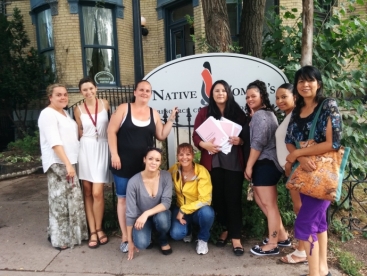 Niki (fourth from right) with some colleagues outside of Native Women's Resource Centre of Toronto |
Douglas VaretteCallwood FellowAboriginal Legal Services TorontoThe Callwood Fellowship allowed me to work at Aboriginal Legal Services of Toronto during the summer. I was able to work with the Advocacy Program which provides free legal assistance to low-income Aboriginal people living in Toronto. I was able to get experience working in a diverse legal environment, being exposed to legal issues from housing security to coroner’s inquests. The work environment is friendly and welcoming, and the staff is dedicated to the community. I feel that I had the advantage of training both my legal skills but also my personal skills as I engaged with both clients and the legal process. It was an amazing experience. | 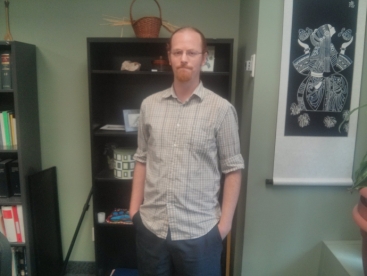 Douglas at Aboriginal Legal Services Toronto |












